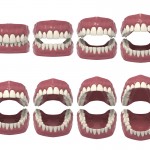
As teeth are lost masticatory efficiency declines and this may have a negative impact on diet which may be of particular relevance in older people. The aim of this trial was to assess the effects of mandibular implant overdentures (IODs) on the nutritional status of an edentate elderly population.
Participants were randomized to receive either new conventional complete dentures (CDs) [ n=127] or maxillary CDs and mandibular IODs on two implants with ball attachments [n=128]. In the implant group dentures were constructed 3 months post implant placement.
The primary outcome was blood serum concentration of homocysteine [tHcy]. Secondary outcomes were blood concentrations of folate, vitamin B6, vitamin B12, C-reactive protein (CRP), and albumin. All nutritional assessments were conducted at baseline, 6 months and 12 months post-treatment,
The authors found
- Loss to follow-up at the 12-monthswas 15% in the IOD group (N = 17) and 14% (N = 19) in the CD group
- The association between treatment and tHcy levels was not statistically significant.
- A decline of folate from baseline values in both study groups, as well as those of vitamins B6 and B12 and albumin,
- Significant between-group differences were detected in food preparation and in the individuals’ ability to chew a variety of foods.
They concluded
This study suggests that implant overdentures do not have a more positive effect on the nutritional state of elderly edentate individuals at 6 and 12 months post-treatment than new complete dentures. However, those wearing IODs are significantly more likely to take in their nutrients through fresh, whole fruits and vegetables.
Awad MA, Morais JA, Wollin S, Khalil A, Gray-Donald K, Feine JS. Implant overdentures and nutrition: a randomized controlled trial. J Dent Res. 2012 Jan;91(1):39-46. Epub 2011 Sep 27. PubMed PMID: 21951464.
The authors noted that at 12 months the trial my be too short to observe changes in the homocysteine and CRP levels. And the the effect of providing more efficient prosthesis may result in more complex changes in eating habits whihc may influence teh paramenter chosen.

[…] Dental Elf – 1st Feb 2012 – Implant overdentures do not have a more positive effect on t… […]